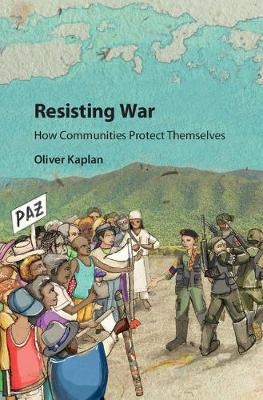
Resisting War
Cambridge University Press (Verlag)
978-1-107-15980-8 (ISBN)
In civil conflicts around the world, unarmed civilians take enormous risks to protect themselves and confront heavily armed combatants. This is not just counterintuitive - it is extraordinary. In this book, Oliver Kaplan explores cases from Colombia, with extensions to Afghanistan, Pakistan, Syria, and the Philippines, to show how and why civilians influence armed actors and limit violence. Based on fieldwork and statistical analysis, the book explains how local social organization and cohesion enable both covert and overt nonviolent strategies, including avoidance, cultures of peace, dispute resolution, deception, protest, and negotiation. These 'autonomy' strategies help civilians retain their agency and avoid becoming helpless victims by limiting the inroads of armed groups.
Oliver Kaplan is an Assistant Professor at the Josef Korbel School of International Studies at the University of Denver. He was previously a postdoctoral Research Associate at Princeton University, New Jersey in the Woodrow Wilson School and at Stanford University, California. His research for Resisting War received the Martin Diskin Dissertation Award honorable mention from the Latin American Studies Association.
1. Introduction: civilian autonomy in civil war; 2. A theory of civilian decision-making in civil war; 3. The history of conflict and local autonomy in Colombia; 4. Living to tell about it: research in conflict settings; 5. How civilian organizations affect civil war violence; 6. Why some communities are more organized than others; 7. The institution of the ATCC: protection through conciliation; 8. Discovering civilian autonomy in Cundinamarca; 9. Civilian autonomy around the world; 10. Conclusions and policy implications.
| Erscheinungsdatum | 22.06.2017 |
|---|---|
| Zusatzinfo | 21 Tables, black and white; 12 Maps; 4 Halftones, black and white; 30 Line drawings, black and white |
| Verlagsort | Cambridge |
| Sprache | englisch |
| Maße | 158 x 235 mm |
| Gewicht | 730 g |
| Themenwelt | Sozialwissenschaften ► Politik / Verwaltung ► Europäische / Internationale Politik |
| Sozialwissenschaften ► Politik / Verwaltung ► Politische Systeme | |
| Sozialwissenschaften ► Politik / Verwaltung ► Staat / Verwaltung | |
| Sozialwissenschaften ► Soziologie | |
| ISBN-10 | 1-107-15980-6 / 1107159806 |
| ISBN-13 | 978-1-107-15980-8 / 9781107159808 |
| Zustand | Neuware |
| Haben Sie eine Frage zum Produkt? |
aus dem Bereich


